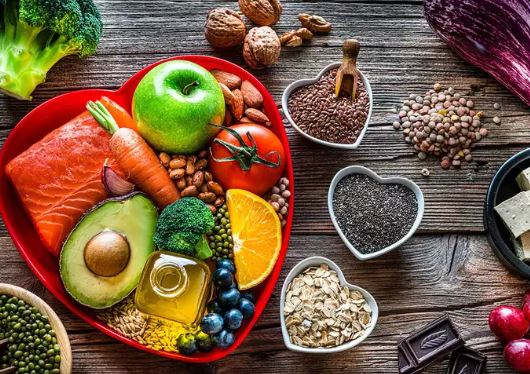Lifestyle
6 food tips that can keep heart diseases at bay

The heart is integral to your overall health since it is a vital component of the systemic circulation, and essentially responsible for regulating and disseminating oxygenated blood and nutrients around the body.
There are numerous risk factors, conditions, or habits that increase a person’s chances of developing cardiovascular diseases (CVDs)- a group of heart-related disorders that include heart failure, angina pain, heart failure, coronary artery disease, arrhythmia and many other heart ailments.
According to the World Health Organization, an estimated 17.7 million people died from CVDs in 2015, representing 31% of all global deaths.
Of these deaths, an estimated 7.4 million were due to coronary heart disease and 6.7 million were due to stroke.
Why change to heart-healthy eating?
A heart disease patient’s condition is permanent. Procedures like angioplasty and bypass surgery can indeed improve blood and oxygen flow to the heart. However, the arteries are still damaged, which means the patient is at risk of having a heart attack. Changing the balance of foods you eat, whether you have heart disease or not, can reduce your overall risk of heart stroke and help boost your heart health. What you wolf down, how active you are, and not smoking can lower your risk by up to 80%. Besides the positive impact on your heart, eating healthy will improve your overall stamina, boost your immunity, and even help you maintain a healthy weight.
Here is what to include and skip in your diet plan which can keep your heart healthy for the long run:
Make healthy choices
A heart-healthy meal includes colourful non-starchy vegetables, fruit, healthy oils, nuts, and seeds. Breakfast should include fresh fruit, a small glass of citrus juice, low-fat or fat-free milk and yoghurt, cereal, and an omelette made with egg whites. Brown rice and whole-grain breads, which are high in fibre and packed with important nutrients, are ideal for lunch and dinner. As per research adding salads like fresh lettuce, spinach, and other greens to meals may lower your risk of dying from a stroke or heart attack.
Include some legumes, fish, seafood
This food group is high in protein, which the body requires for growth and repair. Eating legumes, fish (especially oily fish), and seafood also benefit heart health by reducing oxidative stress in cardiomyocytes and maintaining myocardial structure. Fish is an excellent meat substitute and oily fish contains more heart-healthy omega-3 fats.
Mineral medicine
Several mineral-rich diets can maintain healthy blood pressure levels. A potassium-rich diet, for instance, can help both minimize and maintain blood pressure. A potassium-rich diet not only reduces the effects of salt on blood pressure but also improves it. Other minerals that may help mitigate high blood pressure and improve health include calcium and magnesium. Calcium is abundant in low-fat or fat-free milk and milk products, while magnesium is found in so many whole-grain foods, dark green, leafy vegetables, fish, and dry beans.
Cut down on salts and oil
The majority of the salt and oil we consume comes from processed and ready-to-eat foods. Cutting back on salt, other forms of sodium and cholesterol-causing oils can effectively deter heart-related ailments. Try to keep your every day sodium intake from all foods to no more than 2,300 mg (about 1 teaspoon salt). Choose oils and fats with a higher proportion of unsaturated fats than saturated fats, such as olive and canola oils.
Some general tips include
- Broil, bake, roast, or poach instead of frying.
- Reduce your intake of foods high in calories and fat, particularly saturated and trans fat.
- Use fat-free or 1% milk rather than whole milk or cream.
- Avoid refined carbohydrates e.g. white bread, white flour, sugar etc.
- Reduce intake of alcohol and stop smoking.









